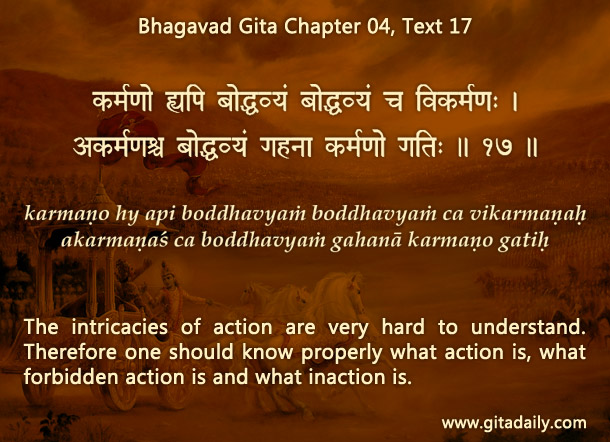Suppose someone gambles for the first time. If they lose, they will consider it a misfortune. Actually however, it can save them from the misfortune of winning. How can winning be a misfortune? Because winning will give them a taste for gambling and make them gamble more. And each time they gamble, impressions will be created in their mind, which will impel them to gamble still more. With the inner propellant of the impressions and with no outer deterrent of the consequences, they will gamble excessively and recklessly, eventually losing big time. They may see those losses as a misfortune, but their misfortune began with what started them on the path to such losses: the initial win.
The same principle applies to all our actions; we are governed by the principles of karma which will unfailingly give us the consequences of our actions, sooner or later. The Bhagavad-gita (04.17) states that the workings of karma are too subtle for us to comprehend. That’s why what seems like fortune or misfortune isn’t always that way. When we see with the eyes of philosophical knowledge, we can choose our actions responsibly.
If we have been doing something wrong and have been getting away without incurring any consequences, we need to become cautious: “Just because I have got away till now doesn’t mean I will get away forever. Eventually, my karma will hit me, and hit me big time. Better let me start rectifying myself right away.”
In contrast, if we do something wrong and get immediate consequences, we may feel resentful, “When others get away with far worse things, why did I have to suffer for my minor misdeed?” Instead, we can feel grateful that we have been protected from far bigger trouble.
Think it over:
- How can getting the consequences of our action save us from misfortune?
- If we have got away without incurring any consequences, how can we see that situation?
- If we have suffered because of an indiscretion, how can we see that situation positive?
***
04.17 The intricacies of action are very hard to understand. Therefore one should know properly what action is, what forbidden action is and what inaction is.
To know more about this verse, please click on the image
Explanation of article:
Podcast:


Leave A Comment